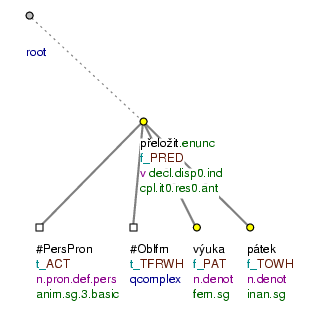- Definition of the
TOWHfunctor -
The
TOWHfunctor (temporal: to when) is a functor for a free modification answering the question "to when?".
With TOWH modifications, the temporal localization does not directly concern the event expressed by the governing word, but rather the TOWH modification situates an event that follows from the event expressed by the governing word, or it situates a modification of the governing event by placing this event or modification into a moment or interval following the moment or interval of the governing event. Example:
Včera.TWHEN svolal schůzi na dnešek.TOWH (=lit. Yesterday (he) called (the) meeting for today.)
This localization is usually expressed by direct specification of time (na pátek (=to Friday), napříště (=for the next time)), rarely by specifying the temporal relation to another event (Odložila hubnutí až na dovolenou. (=lit.(She) postponed slimming till holiday.)).
Valency. TOWH modifications are obligatory (just like the TFRWH modifications) after some verbs with the prefix pře- (e.g. přeložit (=to_postpone), přesunout (=to_delay)).
Forms. The basic forms of TOWH modifications are:
-
prepositional phrase.
The most common forms:
na+4 Svolal schůzi na šestou hodinu. (=lit. (He) called (the) meeting for six o'clock.) pro+4 Pro nejbližší období plánuje ODA setkání se slovenskými poslanci. (=lit. For (the) soonest time is_plannig ODA (a) meeting with Slovak members_of_parliament.) Example:
Přeložil výuku na pátek.
TOWH(=lit. (He) postponed (the) class to Friday.) Fig. 7.15 -
adverbial expressions (very rarely).
Example:
Odložíme to napříště.
TOWH(=lit. (We) shall_delay it till (the) next_time.)
NB! This modification is usually not expressed by a dependent clause. A similar temporal modification modifying a noun can be, however, expressed by a dependent clause (its effective root node is assigned the RSTR functor); e.g.:
Svolal schůzi na dobu.TOWH, kdy už budou.RSTR všichni doma. (=lit. (He) called (the) meeting for (the) time when already everybody will_be at_home.)
Figure 7.15. The TOWH functor

Přeložil výuku na pátek. (=lit. (He) postponed (the) class till Friday.)
Border with the TFHL functor. TOWH modifications are rather marginal, however, their identification in a particular construction is usually unambiguous. They partially border on the meaning "for how long?" (TFHL; see Section 3.2, "TFHL"). For details see Section 3.2.1, "Borderline cases with the TFHL functor".
Border with the DIR3 functor. The meaning "to when?" can in certain cases (esp. with adverbial expressions) border on the directional meaning "where to?" (DIR3; see Section 4.3, "DIR3"). In such cases the choice of the functor depends on the annotator. Cf.:
-
Přesunul jednání až na konferenci. (=lit. (He) postponed (the) negotiation only till (the) conference.)
The modification na konferenci (=till the conference) can express the temporal meaning (answering the question "to when?"; functor
TOWH), but it can also express the location the meeting was tranferred to, therefore it can be assigned theDIR3functor too.